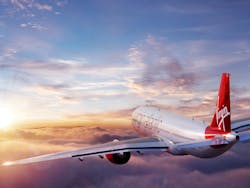Virgin Atlantic Completes Transatlantic Flight Using 100% Sustainable Aviation Fuel
Virgin Atlantic has completed its first transatlantic flight – Flight100 – from London Heathrow to New York JFK using 100% Sustainable Aviation Fuel (SAF) to demonstrate SAF’s capabilities as a safe, compatible drop-in replacement for fossil-derived jet fuel.
The SAF used for Flight100’s transatlantic crossing was a dual blend consisting of 88% Hydroprocessed Esters and Fatty Acids (HEFA) made from waste fats and 12% Synthetic Aromatic Kerosene (SAK) made from plant sugars.
SAF is a fuel made from waste products that delivers carbon dioxide lifecycle emissions savings of up to 70% while performing like and replacing traditional jet fuel. SAF is projected by many to have a significant role in decarbonizing long-haul aviation and promoting pathways to Net Zero 2050.
"Today's historic flight, powered by 100% sustainable aviation fuel, shows how we can both decarbonize transport and enable passengers to keep flying when and where they want,” said UK Transport Secretary Mark Harper. "This Government has backed today's flight to take-off, and we will continue to support the UK's emerging SAF industry as it creates jobs, grows the economy, and gets us to Jet Zero."
However, SAF currently represents less than 0.1% of global jet fuel volumes, and fuel standards only allow for a 50% SAF blend in commercial jet engines. Virgin Atlantic’s Flight100 hopes to prove that the challenge of scaling up SAF production lies in policy and investment, and government assistance will be needed to develop a thriving SAF industry.
“It's taken radical collaboration to get here and we're proud to have reached this important milestone, but we need to push further,” said Virgin Atlantic CEO Shai Weiss. “There is simply not enough SAF, and it's clear that in order to reach production at scale, we need to see significantly more investment. This will only happen when regulatory certainty and price support mechanisms, backed by government, are in place. Flight100 proves that if you make it, we'll fly it."
Virgin Atlantic, with support from its consortium partners ICF, Rocky Mountain Institute, Imperial College London, and the University of Sheffield, will also evaluate the capabilities of SAF by assessing how it affects Flight100’s non-carbon emissions. This research will help improve scientific understanding of the effects of SAF on contrails to help implement contrail forecasts in the flight planning process.
Contrail is the streamer of clouds that can sometimes be observed behind a flying plane. A contrail forms when “… water vapor produced by the combustion of fuel in airplane engines condenses upon soot particles or sulfur aerosols in the plane’s exhaust.”
The collected data and research will be shared with the industry, and Virgin Atlantic has committed to continuing its involvement with contrail work through Rocky Mountain Institute’s Climate Impact Task Force.
About the Author
Breanna Sandridge, Senior Editor
Breanna Sandridge is senior editor for EnergyTech and Microgrid Knowledge, both part of the energy group at Endeavor Business Media.
Prior to that, Breanna was managing editor for Machinery Lubrication and Reliable Plant magazines, both part of Noria Corp. She has two years experience covering the industrial sector.
She also is a 2021 graduate of Northeastern State University (Oklahoma) with a Bachelor's in English.
